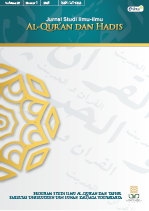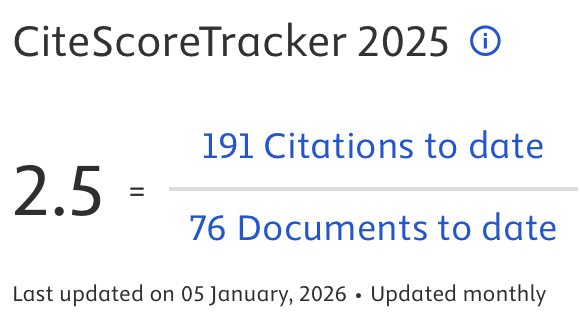SOCIO-GENETIC MOTIVES OF MUI’S FATWA REGARDING COVID-19 BASED ON QURAN-HADITH
DOI:
https://doi.org/10.14421/qh.2021.2201-02Keywords:
socio-genetic motive, MUI, Quran and HadithAbstract
The textual understanding of the Quran and Hadith during the pandemic era has manifested an obstacle for the implementation of the advised health protocols against COVID-19. The textualists try to confront the Quran and Hadith with the social reality of health. They insisted that one should only fear of Almighty God Almighty, not the corona virus, and the congregation of the prayers should be performed at mosques. Against this backdrop, MUI released a guide to worship during the holy month of Ramadan 2020 in the midst of COVID-19. This article, subscribing to qualitative research method investigates the MUI guidance through socio-genetic motive theory. Following the thematic framework, this research found that MUI's socio-genetic motive in appropriating COVID-19 as a mercy (rahmat) is to reduce the potential for conflict, in shifting the meaning of worship to not only in the mosque is to form household harmony, and in optimizing fasting, and zakat is to foster social awareness. While the MUI's motive for basing on Hadith in ordering the use of masks is self-protection and other fellow humans, the motive for maintaining personal hygiene is social health awareness, and the motive to stay at home is not to endanger others. The novelty of this research is to answer the idealism of textualists by combining the study of religious texts with social theory.
Keywords: socio-genetic motive; MUI; Quran and Hadith
References
Abdullathif, Abdurrahman bin Shalih. Al-Qowa’id Wa Al-Dlawabit Al-Fiqhiyyah Al-Mutadlamminah Li Al-Taisir. Vol. 2. Madinah: Imadah al-Bahs al-Ilmi bi al-Jamiah al-Islamiyah, 2003.
Ahmadi, Abu. Psikologi Sosial. Jakarta: PT. Rineka Cipta, 2002.
Al-Bujairomi, Sulaiman bin Ahmad. Hâsyiyah ‘Ala Al-Khothîb. Beirut: Dar al-Kutub al-`Ilmiyah, 2001.
Al-Bukhari, Muhammad ibn Bardizbah. Al-Jami’ Al-Shahih. Cairo: Dar al-Hadits, 1992.
Al-Ghazali, Muhamad bin Muhamad. Ihya’ Ulum Ad-Din. Bairut: Dar al-Kutub al-Ilmiyah, 2010.
Al-Ghazi, Muhammad bin Qasim bin Muhammad bin Muhammad. Fath Al-Qarib Al-Mujib Fi Syarh Alfadz Al-Taqrib. Beirut: Dar Ibn Hazm, 2005.
Al-Isfahani, Raghib. Mu’jam Al Mufradat Fi Gharibil Qur’an. Mesir: Mushtafa al-bab al Halabi wa Auladuhu, 1961.
Al-Jalind, Muhammad al-Sayyid. Al-Wahyu Wal Al-Insan. Kairo: DAr Quba’ li al-Thiba’ah wa al-Nasyr wa al-Tauzi’, n.d.
Al-Mahalli, Jalaluddin. Syarah Al-Waraqat. Indonesia: Al-Haramain, 2011.
Al-Nawawi, Muhyiddin Yahya bin Syaraf. Al-Minhaj Syarh Shahih Bin Muslim Al-Hajjaj. Vol. 3. Beirut: Dar Ihya’ al-Turats al-Arabi, 1392.
Al-Qalyubi, Ahmad Salamah, and Ahmad al-Barlasi Umairah. Hasyiyata Qalyubi Wa Umairah. Vol. 1. Beirut: Dar al-Fikr, 1995.
Al-Qardhawi, Yusuf. Al-’Ibadah Fi Al-Islam. Mesir: Maktabah Wahbah, 1995.
Al-Qasimi, Muhammad Jamaluddin. Mau’idzatu Al-Mu’minin Min Ihya’ Ulum Ad-Din. Bairut: Dar al-Kutub al-Ilmiyah, 1995.
Al-Tabrani. Al-Mu’jam Al-Kabir. Aleppo: Maktabah Isa al-Bab al-Halabi, 2003.
Amalia, Iis Nur. “Motif Sosial Masyarakat Desa Baros Kecamatan Ketanggungan Kabupaten Brebes Dalam Merespon Pengajian Akbar.” Yogyakarta: Skripsi Fakultas Ushuluddin, UIN SUKA, 2013.
Anam, K. “PENDIDIKAN PERILAKU HIDUP BERSIH DAN SEHAT DALAM PRESFEKTIF ISLAM.” Jurnal Sagacious, 2016.
Anshory, A C Al, F A Hudaefi, U L Junari, M H Zaenal, and ... “The Role of Zakat Institution in Preventing Covid-19.” Policy Brief Pusat Kajian Strategis BAZNAS, 2020.
Antaranews. “‘Jangan Takut Corona, Takutlah Pada Tuhan’ Disebut Justru Tak Sesuai Ajaran Rasul,” 2020.
Anwar Sadat Harahap, and Dalyanto. “KAJIAN HUKUM ISLAM TERHADAP MANFAAT ZAKAT DALAM PENGEMBANGAN EKONOMI MASYARAKAT.” AMALIAH: JURNAL PENGABDIAN KEPADA MASYARAKAT, 2020. https://doi.org/10.32696/ajpkm.v4i1.402.
Ar-Razi, Fakhr al-Din. Mafatih Al-Ghaib. Beirut: Dar al-Kutub al-`Ilmiyah, 2015.
Asqalani, Ibn Hajar. Fath Al-Bari Syarh Shahih Al-Bukhari. Vol. 10. Beirut: Dar al-Ma’rifah, 1379.
Az-Zarnuji, Burhanuddin. Ta’lim Al-Muta’allim. Indonesia: Al-Haramain, 2010.
Christina, Veronika, and Widayatmoko Widayatmoko. “Analisis Motif Penyebaran Hate Speech Di Media Sosial Facebook.” Koneksi 1, no. 2 (2018): 582–87.
Dany, Adim Indilla. “Pengaruh Kebutuhan Prestasi, Kekuasaan, Dan Afiliasi Terhadap Kinerja Karyawan (Studi Pada Karyawan Asuransi Jiwa Bersama Bumiputera 1912 Cabang Batu).” Jurnal Administrasi Bisnis 24, no. 2 (2015).
Dermawan, Oki. “Pendidikan Karakter Siswa Melalui Ibadah Puasa.” Edukasia : Jurnal Penelitian Pendidikan Islam, 2013.
https://doi.org/10.21043/edukasia.v8i2.752.
Detik. “Menag Soal Ibadah Ramadhan Di Tengah Corona: Tak Ada Bukber, Tarawih Di Rumah,” 2020.
Firmansyah, M Adi. “Pengaruh Puasa Ramadhan Pada Beberapa Kondisi Kesehatan.” CDK-230, 2015.
Hadi, Sopyan. “Konsep Sabar Dalam Al-Qur’an.” Jurnal Madani, 2018.
Haitami, Ibnu Hajar. Tuhfah Al-Muhtaj Fi Syarh Al-Minhaj. Vol. 2. Kairo: Maktabah Tijariyyah al-Kubra, 1983.
Hamjah, Salasiah Hanin, Zainab Ismail, and Noor Shakirah Mat Akhir. “Kaedah Penerapan Ibadah Dalam Kaunseling.” Sains Humanika 59, no. 1 (2012).
Hasibuan, Eko Misbahuddin, and Muhammad Yusram. “Hukum Salat Berjamaan Di Masjid Dengan Saf Terpisah Karena Wabah COVID-19.” BUSTANUL FUQAHA: Jurnal Bidang Hukum Islam 1, no. 2 (2020): 106–24.
Hilman, Yusuf Adam. “Motif Wanita Rawan Sosial Dan Ekonomi Dalam Komunitas Ikatan Janda Muslimah Ponorogo (IJMP).” Simulacra 1, no. 2 (2018): 163–72.
Ibnu Asyur, Muhammad Thahir bin Muhammad. At-Tahrir Wa at-Tanwir. Tunisia: Ad-Dar at-Tunisiah Li an-Nasyr, 1984.
Ibnu Mandzur, Muhamad bin Mukrim. Lisan Al-’Arab. Bairut: Dar Shadir, 1999.
Ibnu Rusyd, Muhammad bin Ahmad. Bidayatu Al-Mujtahid Wa Nihayatu Al-Muqtashid. Mesir: Dar al-Hadits, 2004.
Ibnu Taimiyyah, Taqiyyuddin Muhamad. Al-’Ubudiyyah. Mesir: Dar al-Ashalah, 1999.
Iskandar, Iskandar, Winda Restu Anggraini, and Budi Rahman. “Persepsi Pasien Gangguan Jiwa Tentang Aspek Positif Dan Negatif Dari Tindakan Restrain Fisik Pada Pasien Rawat Inap.” Holistik Jurnal Kesehatan, 2019. https://doi.org/10.33024/hjk.v13i3.1397.
KompasTv. “[FULL] Penjelasan MUI Tentang Panduan Ramadan Di Tengah Pandemi Corona.” Jakarta, 2020.
Kurniawan, Alhafiz. “Ini Hadits Rasulullah Seputar Wabah Penyakit, Thaun, Atau Covid-19.” NU Online, 2020.
Luthfi, Hanif. Mengenal Lebih Dekat MUI. Jakarta: Lentera Hati, 2012.
M Hikmat, Mahi, Ujang Suyatman, Dadan Firdaus, and Deni Suswanto. “Implementasi Maqasid Syari’ah Dalam Ikhtiar Memutus Mata Rantai Persebaran Covid-19 Di Indonesia.” Pusat Perpustakaan UIN Sunan Gunung Djati Bandung, 2020.
Mawaddah, Mawaddah. “Motivasi Ibu Muda Bergabung Dengan Hijabersmom Community Aceh.” Jurnal Komunikasi Global 6, no. 1 (2017): 90–101.
Mth, Asmuni. “Konsep Pembangunan Ekonomi Islam.” Al-Mawarid, 2003. https://doi.org/10.20885/almawarid.vol10.art9.
Muchlas, Makmuri. Perilaku Organisasi. Yogyakarta: PT. Karipta, 1994.
Mukharom, and Havis Aravik. “Kebijakan Nabi Muhammad Saw Menangani Wabah Penyakit Menular Dan Implementasinya Dalam Konteks Menanggulangi Coronavirus Covid-19.” SALAM; Jurnal Sosial & Budaya Syar-I 7, no. 3 (2020): 239–46.
Mursyid, Achmad Yafik. “Deturkifikasi Dalam Tafsir Hak Dini, Kur’an Dili Karya Elmalili Hamdi Yazir.” Jurnal Studi Ilmu-Ilmu Al-Qur’an Dan Hadis, 2020. https://doi.org/10.14421/qh.2020.2101-06.
Mushodiq, Muhamad Agus, and Ali Imron. “Peran Majelis Ulama Indonesia Dalam Mitigasi Pandemi Covid-19 (Tinjauan Tindakan Sosial Dan Dominasi Kekuasaan Max Weber).” SALAM: Jurnal Sosial Dan Budaya Syar-I 7, no. 5 (2020): 403.
Muslim, Al-Naysaburi. Al-Jami’ Al-Shahih. Beirut: Dar al-Fikr, 2001.
Mustaqim, Abdul. “Teologi Bencana Dalam Perspektif Al-Qur�an.” Nun: Jurnal Studi Alquran Dan Tafsir Di Nusantara 1, no. 1 (2015).
Naan, Naan, Yumna Yumna, Adnan Adnan, and others. “Kontribusi Sufisme Di Bidang Kesehatan Jiwa Dalam Menghadapi Covid-19.” LP2M, 2020.
Nawawi, Muhyiddin Yahya bin Syaraf. Al-Majmu’ Syarh Al-Muhadzdzab. Vol. 4. Beirut: Dar al-Fikr, n.d.
———. Raudlah Al-Thalibin Wa Umdah Al-Muftin. Vol. 1. Beirut: al-Maktab al-Islami, 1991.
nurul Wathoni, Lalu Muhammad, and others. “TAFSIR VIRUS (FAUQA BA’{=U}DHAH): KORELASI COVID-19 DENGAN AYAT-AYAT ALLAH.” El-’Umdah 3, no. 1 (2020): 63–84.
Pasaribu, Hardi. “Pengaruh Pelaksanaan Pemberian Insentif Terhadap Motivasi Kerja Pegawai Dinas Pendapatan Provinsi Sumatera Utara,” 2008.
Pramiyanti, Alila, Idola Perdini Putri, and Reni Nureni. “Motif Remaja Dalam Menggunakan Media Baru (Studi Pada Remaja Di Daerah Sub-Urban Kota Bandung).” Komuniti: Jurnal Komunikasi Dan Teknologi Informasi 6, no. 2 (2017): 95–103.
Rahmawati, Ulfah. “Motif Sosio-Theogenetis Dalam Tradisi Manakiban Masyarakat Mejobo Kudus.” FIKRAH, 2019. https://doi.org/10.21043/fikrah.v7i1.4842.
Rosbi, Abd Rahman, and Ahmad Sanep. “Keberkesanan Bantuan Modal Zakat Dari Perspektif Penerima: Kajian Kes Negeri Selangor Dan Wilayah Persekutuan.” Persidangan Kebangsaan Ekonomi Malaysia Ke VI (PERKEM VI), 2011.
Rusli, Abdul Rahman. “MUSIBAH DALAM PERSPEKTIF ALQURAN: Studi Analisis Tafsir Tematik.” Journal Analytica Islamica 1, no. 1 (2012): 148–62.
Saprudin, Muhamad, Muslihin Amali, and Sari Narulita. “Motivasi Pemakaian Jilbab Mahasiswi Islam Universitas Negeri Jakarta.” Jurnal Online Studi Al-Qur’an, 2016. https://doi.org/10.21009/jsq.012.2.04.
Sarwono, Sarlito. Psikologi Sosial Individu Dan Teori-Teori Sosial. Jakarta: Balai Pustaka, 2002.
Sobur, Alex. Psikologi Umum. Bandung: Pustaka Setia, 2003.
Syandri, and Fadhlan Akbar. “Penggunaan Masker Penutup Wajah Saat Salat Sebagai Langkah Pencegahan Wabah Coronavirus Covid-19.” SALAM; Jurnal Sosial & Budaya Syar-I 7, no. 3 (2020): 261–68.
Syatha, Syaikh Abu Bakar. I’anatu Ath-Thalibin. Bairut: Dar al-Kutub al-`Ilmiyah, 2015.
Syathibi, Ibrahim bin Musa bin Muhammad. Al-I’tisham. Vol. 2. Saudi Arabia: Dar Ibn Affan, 1992.
Thabari, Abu Ja`far Muhammad ibn Jarir. Jami` Al-Bayan `an Ta`wil Ay Al-Qur’an. Giza: Dar al-Hijr, 2001.
Usman, S A. “Strategi Pengelola Zakat Dalam Menggulangi Kemiskinan.” Dedikasi: Journal of Community Engagment, 2019.
Wiyoso, Joko. “MOTIVASI MASUKNYA CAMPURSARI KE DALAM PERTUNJUKAN JARAN KEPANG.” Harmonia - Journal of Arts Research and Education, 2012. https://doi.org/10.15294/harmonia.v12i1.2217.
World Health Organization. “Anjuran Mengenai Penggunaan Masker Dalam Konteks COVID-19,” 2020.
Zarqa, Ahmad bin al-Syaikh bin Muhammad. Syarh Al-Qawaid Al-Fiqhiyyah. Damaskus: Dar al-Qalam, 1989.
Zuhurul Fuqohak, Muhkamad Agus. “Rekonseptualisasi Terminologi Khalwat –Kwajikan Di Dunia Tasawuf Menurut Islam Transformatif.” Esoterik, 2017. https://doi.org/10.21043/esoterik.v3i2.4473.
Downloads
Published
Issue
Section
License
Publishing your paper with Jurnal Studi Ilmu-ilmu al-Qur'an dan Hadis means that the author or authors retain the copyright in the paper. Jurnal Studi Ilmu-ilmu al-Qur'an dan Hadis uses license CC-BY-NC-ND or an equivalent license as the optimal license for the publication, distribution, use, and reuse of scholarly works. This license permits anyone to copy and redistribute the material in any medium or format and must give appropriate credit, provide a link to the license, and indicate if changes were made. If you remix, translate, transform or build upon the material you may use it for private use only and not for distribution. Jurnal Studi Ilmu-ilmu al-Qur'an dan Hadis granted an exclusive non-commercial reuse license by the author(s), but the author(s) are able to put the paper onto a website, distribute it to colleagues, give it to students, use it in your thesis, etc, so long as the use is not directed at a commercial advantage or toward private monetary gain. The author(s) can reuse the figures and tables and other information contained in their paper published by Jurnal Studi Ilmu-ilmu al-Qur'an dan Hadis in future papers or work without having to ask anyone for permission, provided that the figures, tables, or other information that is included in the new paper or work properly references the published paper as the source of the figures, tables or other information, and the new paper or work is not direct at a private monetary gain or commercial advantage.
Jurnal Studi Ilmu-ilmu al-Qur'an dan Hadis journal Open Acces articles are distrubuted under the Creative Commons Attribution-NonCommercial-NoDerivatives 4.0 International (CC BY-NC-ND 4.0). Article can be read, copy and redistribute the material ini any medium or format under the following conditions:
Attribution — You must give appropriate credit, provide a link to the license, and indicate if changes were made. You may do so in any reasonable manner, but not in any way that suggests the licensor endorses you or your use.
NonCommercial — You may not use the material for commercial purposes.
NoDerivatives — If you remix, transform, or build upon the material, you may not distribute the modified material.










